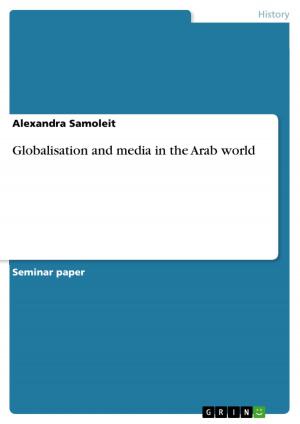An Analysis of the Effect of Ideology on the Life Expectancy of Terrorist Organisations
Nonfiction, Science & Nature, Mathematics, Statistics| Author: | Tony Wragg | ISBN: | 9783640181810 |
| Publisher: | GRIN Publishing | Publication: | October 7, 2008 |
| Imprint: | GRIN Publishing | Language: | English |
| Author: | Tony Wragg |
| ISBN: | 9783640181810 |
| Publisher: | GRIN Publishing |
| Publication: | October 7, 2008 |
| Imprint: | GRIN Publishing |
| Language: | English |
Master's Thesis from the year 2008 in the subject Statistics, grade: Passed, RMIT (RMIT), course: Master of Engineering (systems engineering), 120 entries in the bibliography, language: English, abstract: This thesis investigates the effect of ideology on the survival times of 557 terrorist organisations. While there is broad acceptance of the view that the majority of terrorist organisations are short-lived, quantitative studies of the life spans of terrorist organisations are rare. Terrorist organisations go to great lengths to ensure their survival, with many terrorist organisations viewing their continued existence as a victory in itself. Within the broader field of organisational analysis, an organisation's age is viewed as a key variable in explaining the development of its structures, functions, and, most importantly, its likelihood of continued survival. The ideology through which a terrorist organisation views the world is thought by many scholars of terrorism to play an important role in its justification for violence, its strategic intentions, the targets it selects, and its survival prospects. While many typologies of terrorist ideologies have been proposed, one of the most common approaches uses four broad categories of ideological orientation: Separatist/nationalist, left-wing, religious, and right-wing. Separatist/nationalist organisations are widely believed to have much greater longevity than organisations that lack a distinct, territorially bounded, ethno-nationalist base. The non-parametric and semi-parametric statistical analyses of the life spans of 557 terrorist groups presented in this thesis are complemented by a description of various stage-based life cycle models. The concept of an organisational life cycle is used to highlight and explain some of the frequently observed patterns and behaviours of terrorist organisations as they form, grow, peak, fragment, and fail. This provides the contextual background to the quantitative analysis. This thesis emphasises a longitudinal approach to understanding terrorist organisations.
Master's Thesis from the year 2008 in the subject Statistics, grade: Passed, RMIT (RMIT), course: Master of Engineering (systems engineering), 120 entries in the bibliography, language: English, abstract: This thesis investigates the effect of ideology on the survival times of 557 terrorist organisations. While there is broad acceptance of the view that the majority of terrorist organisations are short-lived, quantitative studies of the life spans of terrorist organisations are rare. Terrorist organisations go to great lengths to ensure their survival, with many terrorist organisations viewing their continued existence as a victory in itself. Within the broader field of organisational analysis, an organisation's age is viewed as a key variable in explaining the development of its structures, functions, and, most importantly, its likelihood of continued survival. The ideology through which a terrorist organisation views the world is thought by many scholars of terrorism to play an important role in its justification for violence, its strategic intentions, the targets it selects, and its survival prospects. While many typologies of terrorist ideologies have been proposed, one of the most common approaches uses four broad categories of ideological orientation: Separatist/nationalist, left-wing, religious, and right-wing. Separatist/nationalist organisations are widely believed to have much greater longevity than organisations that lack a distinct, territorially bounded, ethno-nationalist base. The non-parametric and semi-parametric statistical analyses of the life spans of 557 terrorist groups presented in this thesis are complemented by a description of various stage-based life cycle models. The concept of an organisational life cycle is used to highlight and explain some of the frequently observed patterns and behaviours of terrorist organisations as they form, grow, peak, fragment, and fail. This provides the contextual background to the quantitative analysis. This thesis emphasises a longitudinal approach to understanding terrorist organisations.















